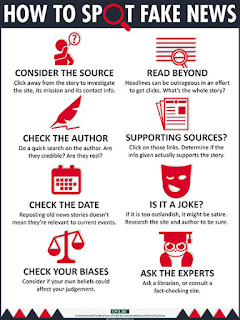How To Spot Fake News
How To Spot Fake News...IFLA
Critical thinking is a key skill in media and information literacy, and the mission of libraries is to educate and advocate its importance.
Discussions about fake news has led to a new focus on media literacy more broadly, and the role of libraries and other education institutions in providing this.
When Oxford Dictionaries announce post-truth is Word of the Year 2016, we as librarians realise action is needed to educate and advocate for critical thinking – a crucial skill when navigating the information society.
IFLA has made this infographic with eight simple steps (based on FactCheck.org’s 2016 article How to Spot Fake News) to discover the verifiability of a given news-piece in front of you. Download, print, translate, and share – at home, at your library, in your local community, and on social media networks. The more we crowdsource our wisdom, the wiser the world becomes.
http://www.ifla.org/publications/node/11174
Fake news is nothing new. But bogus stories can reach more people more quickly via social media than what good old-fashioned viral emails could accomplish in years past.
Concern about the phenomenon led Facebook and Google to announce that they’ll crack down on fake news sites, restricting their ability to garner ad revenue. Perhaps that could dissipate the amount of malarkey online, though news consumers themselves are the best defense against the spread of misinformation.
Not all of the misinformation being passed along online is complete fiction, though some of it is. Snopes.com has been exposing false viral claims since the mid 1990s, whether that’s fabricated messages, distortions containing bits of truth and everything in between. Founder David Mikkelson warned in a Nov. 17 article not to lump everything into the “fake news” category. “The fictions and fabrications that comprise fake news are but a subset of the larger bad news phenomenon, which also encompasses many forms of shoddy, unresearched, error-filled, and deliberately misleading reporting that do a disservice to everyone,” he wrote.
A lot of these viral claims aren’t “news” at all, but fiction, satire and efforts to fool readers into thinking they’re for real.
http://www.factcheck.org/2016/11/how-to-spot-fake-news/

Comments
Post a Comment